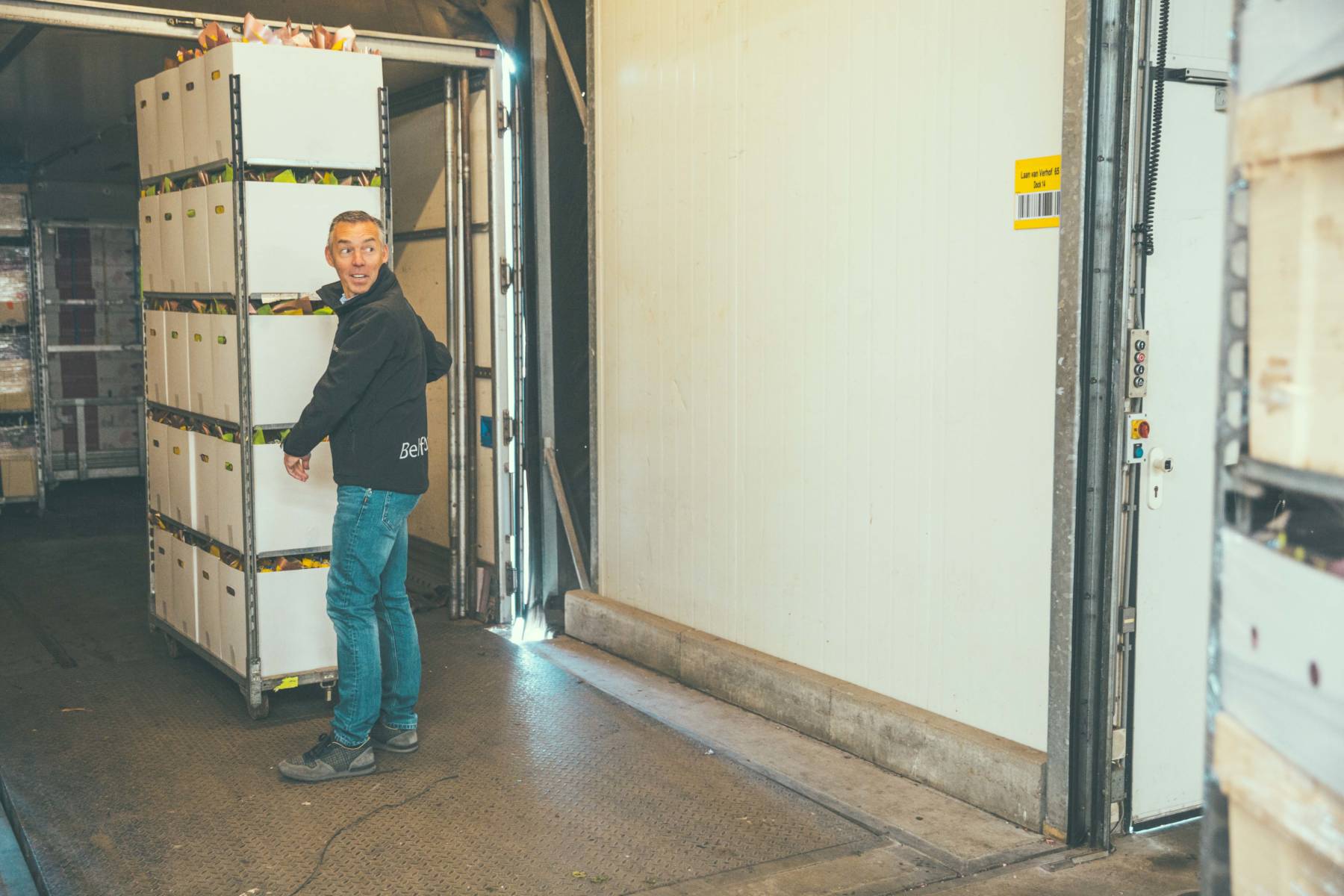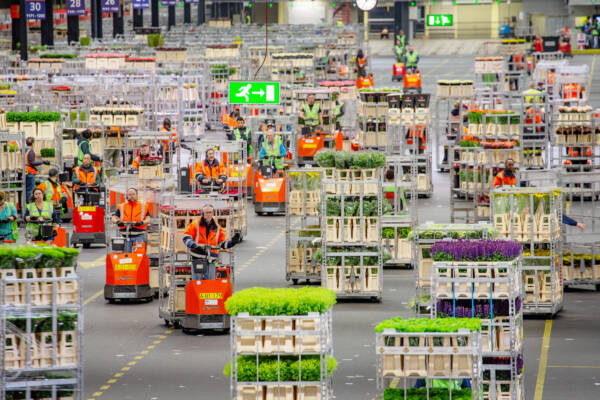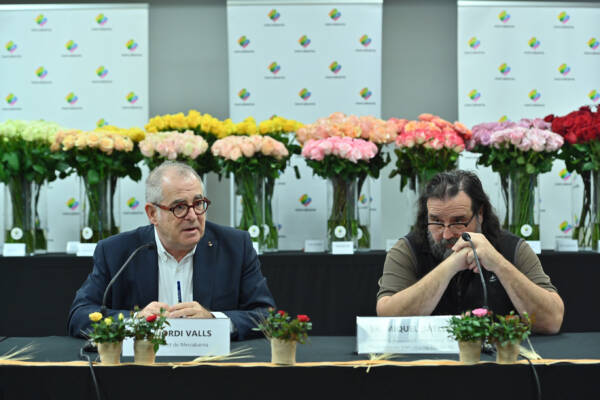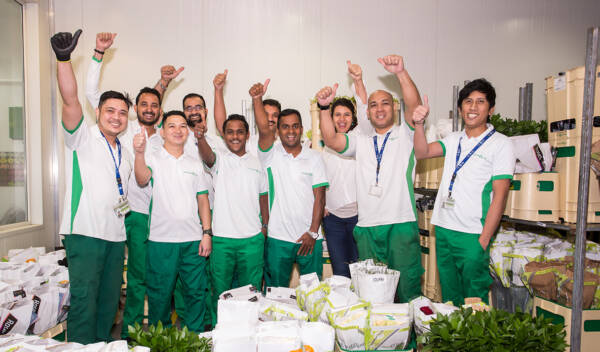RIJNSBURG, Netherlands: Floral wholesaler Geert Snauwaert from Belgium took to social media and posted pictures of Kenyan roses travelling in a plane’s passenger compartment to express solidarity with a country that is among the world’s top flower growers. Now that most countries in the world are gearing up for Mother’s Day, a lack of cost-effective options for shipping flowers from Africa to Europe causes an imbalance of Dutch and imported roses. These two products usually complement each other perfectly.
Snauwaert does not keep precise records of how many Kenyan roses he buys per year but thinks that Kenyan blooms make up roughly 35 per cent of his rose portfolio. That is, under normal circumstances, when the Royal FloraHolland’s auction clock in Rijnsburg offers buyers the perfect mix of large-headed, long-stemmed Dutch roses for the luxury market and shorter and medium-sized roses from Kenya for the middle-market consumer.
Kenya is an essential source of roses. The East African nation accounts for one-third of all roses sold in the European Union with Royal FloraHolland serving as the most dynamic trading platform for Kenyan roses. However, restrictions on movement to contain the coronavirus pandemic have disrupted the critical harvest season, delayed, and cancelled shipments to the Netherlands and triggered a spike in air cargo rates.
In a day of dramatic developments, Dutch auction house Royal FloraHolland saw on 16 March how roses median prices dropped to €0.07 a stem, down 70 per cent from their price a year earlier while a significant proportion of blooms remained unsold.
Since then, Royal FloraHolland’s safeguard measures at auction, modelled on a temporary quota system with maximum daily volumes per product group and grower, have managed the supply and demand better. On 29 April, Royal FloraHolland started to ease its supply regulations incrementally for the next five weeks. Things at the world’s famous hub for flower trade are certainly not back to normal, but several product groups such as roses are recovering. Scarcity and Mother’s Day, celebrated in most countries of the world on the second Sunday in May, are driving up rose prices.
Snauwaert comments, “As we speak it is a challenge to buy large-headed Dutch grown roses at 70cm under €1 a stem, which is exceptional for this time of year. For rose growers, these are Valentine prices, which is very good for them to help them get through this difficult period. Even Kenyan roses at 50cm do not sell below €0.40; most blooms sell above €0.50. However, there is a clear imbalance between supply volumes of Dutch roses and imported roses from Africa.”
Snauwaert says that the present market situation comes at the detriment of Kenyan roses. Freight capacity is the biggest problem, and Kenya has been particularly affected as the country relies on passenger-freight combined flights. Many of these are triangular connections with complete disruption of the system.
Husband and wife team Geert and Liesbeth Snauwaert established their floral wholesale company Belfleur in 1996 and serve mainly Belgium and French florists.
Both acknowledge that the coronavirus pandemic sparked a lot of ‘gloom and doom’ in the floriculture sector but are quick to add that there is also ‘bloom and blossom.’ Snauwaert says, “The coronavirus crisis is a catalyst for entrepreneurship with flexible businesses rising to the challenge. Crisis fuels innovations and offers new opportunities, and the present coronavirus pandemic will arguably not be an exception. People stuck in their homes and amid all the world chaos feel the need to spruce up their abodes by surrounding themselves with flowers. I guess that there have never been so many people searching the web for possibilities to buy flowers in a country under lockdown. Florists offering online flower delivery are one of the ‘winners’ of this situation with orders coming in thick and fast over the past few weeks and customers show a more than average satisfaction with their bouquet or houseplant.”
The Belgium wholesaler notes that online delivery has helped retail florists to reach new customers. ‘They will use this growing customer base for future online sales promotion ideas. I can ensure you that several florists in Belgium and France are reporting a Mother’s Day turnover for five weeks in a row. I guess they definitely will need a holiday post coronavirus.”
Belfleur positions itself as an online purchasing platform. In what way does the company differ from the traditional auction-based flower exporter? Snauwaert explains, “Our customers can order online from their home, and there is no need to drive out to find a cash-and-carry store that might be open. So, if they needed flowers, we are one of the few sales outlets. As such, we took some risks at the outbreak of the coronavirus by continuing to offer the full assortment. A clear overview of the large quantity and premium quality product on offer is needed, to be a successful flower exporter online. The website must be tailored to the use of the florist, bearing in mind that a florist is a true flower and plantsman and not a computer nerd.”
Snauwaert has witnessed incredible initiatives in his home country Belgium. “An idea devised by one of the many florists in our country has proved to be successful. The florist took to the computer and emailed the larger companies in their area by suggesting the idea of sending their homeworkers flowers. Employers showed a true spirit of solidarity and unity and were sincerely worried about their employees and thought this was a great initiative. In less than four weeks, she had delivered more than 1,200 flower bouquets to the employees’ homes.”
Snauwaert concludes by saying that the path to business is undoubtedly not sprinkled with rose petals and that there are many challenges to overcome. “Over the past few weeks, I have spent more time money and energy making online appointments with customers and transportation companies as well as setting up new transport systems and finding solutions to supply our customers in a lockdown country. It costs extra money, but safeguard measures are necessary to serve customers. This crisis will change our industry with traditional values suddenly gone, and new values and sales systems emerging as we adjust to thinking utterly differently than before the crisis. Our mindset has instantly changed.”
Belfleur Quick Facts
- Founded in 1996
- Owners Geert and Liesbeth Snauwaert
- Located at FloraHolland Rijnsburg
- Core business: floral wholesale serving florists in Belgium and France.
- No direct imports
- Belfleur is a quintessential family business with Geert’s father delivering flowers at the doorstep of Belgium’s florists with his van.
- His mother owned a florist shop. In the 1980s, Geert and his father founded a flower import business, buying flowers from Kenya and Zimbabwe.
- The number of employees: 16











































